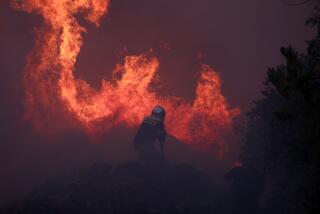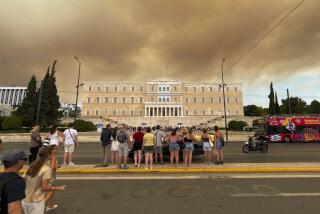Fiddling Around While Athens Burns
- Share via
ATHENS — So, is Athens simply Greek for “Atlanta”?
Stop me if you’ve heard this before, but on the first day of full competition at these Summer Olympics, a bus carrying journalists from the Olympic Sailing Center toward the city center first stopped so the driver could pick up a friend, then stopped altogether.
“End of route,” the driver announced as he pointed to the exit door, for no apparent reason except perhaps he wished to spend some quality time alone with his friend. Reporters suddenly found themselves stranded without a map, without a clue, but luckily with enough euros to hail a cab and straggle back to the main press center.
The “INFO 2004” computerized results system, which proved reasonably efficient before the Games began, turned sluggish as soon as there were actual results to report. After a long day of fielding complaints from frustrated journalists, the Athens Olympic Organizing Committee issued a written statement expressing “regret” for any “inconvenience this slowness maybe have caused,” and then, a while later, spat out another.
Said the operators of the system responsible for dispensing information about the Athens Olympic Games: “The information you are requesting is not available.”
A day after overseeing a successful, safe and only slightly insane Olympic opening ceremony, Gianna Angelopoulos- Daskalaki, president of the Athens 2004 organizing committee, watched 60 firefighters try to contain a raging fire near her hillside mansion.
Cause of the blaze? Fireworks ignited at a party hosted by Angelopoulos-Daskalaki.
Most encouraging news of the day? No one was hurt.
And what about the flame inside the Olympic caldron? Did it really go out for 20 minutes early Saturday morning, as Australia’s Herald Sun reported?
“Oops, anyone got a light?” read the headline on the Herald Sun website, which included a photograph of a seemingly extinguished Olympic flame taken “only hours after the opening ceremony.”
Athens organizers denied the charge, saying the flame never went out -- they were only “adjusting” the flame.
At the Aquatic Center, where swimmers beat the near-100-degree heat by jumping into the water, spectators and reporters paid the price for the Greeks’ having run out of time to construct a roof over the pool. Desperate for shade, fans huddled under more umbrellas than you’d find during a Wimbledon rain delay. The unprotected media section looked like something out of “Lawrence of Arabia,” with some sportswriters going shirtless -- male sportswriters; this wasn’t the Athens opening ceremony -- and others sheathing their heads in towels while wondering how to treat second-degree keyboard burns.
In lieu of roofed shade, the poolside message board offered these helpful tips:
“Wear your hat”
“Drink plenty of fluids”
“Wear sunscreen”
As they complied, fans probably wondered what happened to the message that should have flashed across the board but never did: “We sincerely apologize for not getting our act together in time.”
Empty seats were commonplace at venues throughout the area. Is it any wonder? The tickets are expensive. The temperatures were oppressive. Even after sunset, Michael Phelps’ first final, which resulted in his first gold medal, unfolded inside a stadium that was about three-quarters filled.
Post-competition interview translations also had some early-round kinks.
After Yana Klochkova of Ukraine won the women’s 400-meter individual medley final, reporters asked questions in English, but no answers were translated into English.
After Li Du of China won the first gold medal of the Games, the women’s 10-meter air rifle event, she was surrounded by four interpreters -- one fluent in Chinese, one in Greek, one in English and one in Russian, for silver medalist Lioubov Galkina. Each interpreter painstakingly introduced each medalist, causing Chinese journalists on deadline to lose patience midway through Galkina’s four-by-one introduction.
“We know! We already know that!” the Chinese reporters shouted, some clenching their fists. “We want to interview the winner!”
Friday night’s opening ceremony may have enthralled thousands of Greeks and visitors, but Hercules and Apollo have definitely left the building. On the day after, Athens was channeling the spirit of Atlanta ‘96, which had its own mythology, none of it worth chiseling into marble.
Zeus, let me introduce you to Izzy.
Atlanta never had anything like what is confronting Athens on the first weekend of its Olympics -- the suspension of its nation’s two most famous athletes, sprinters Costas Kenteris and Katerina Thanou, for missing a mandatory drug test.
Saturday, Greek Olympic officials voted, 5-1, to suspend Kenteris, the 200-meter champion in Sydney, and Thanou, the 100-meter silver medalist in Sydney, immediately, pending the result of their Monday hearing before an IOC disciplinary hearing.
As the woods outside Angelopoulos-Daskalaki’s estate smoked and smoldered, it had to be said:
There have been better starts to Olympic Games.
It’s early, very early, here in the birthplace of the Olympics. But already it’s rally time.
More to Read
Go beyond the scoreboard
Get the latest on L.A.'s teams in the daily Sports Report newsletter.
You may occasionally receive promotional content from the Los Angeles Times.






